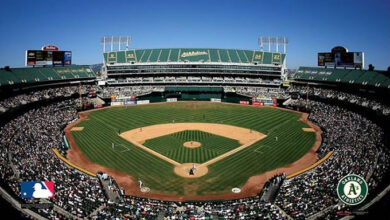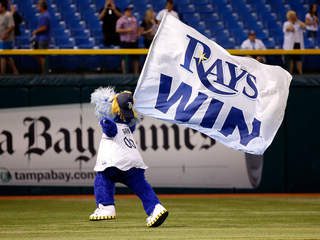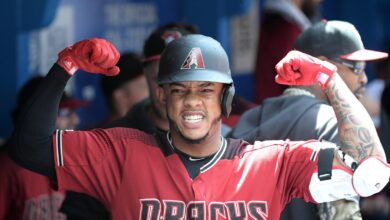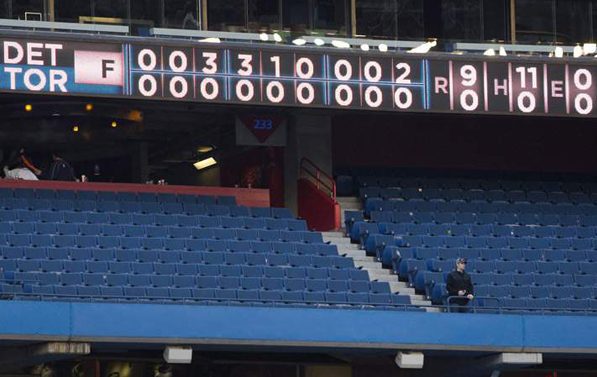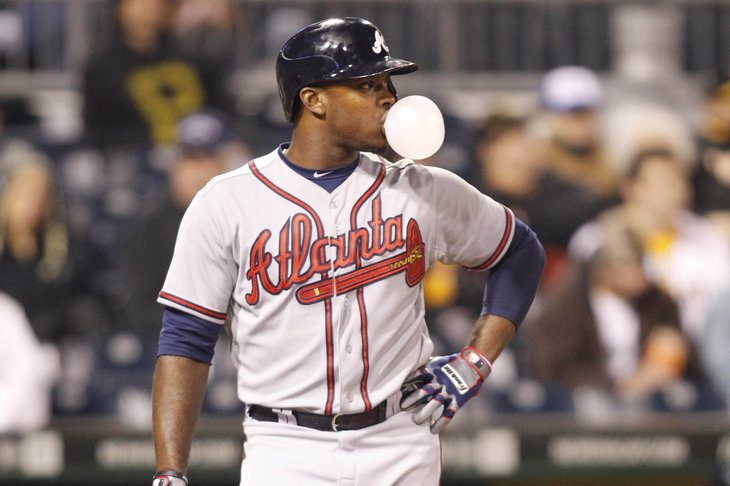
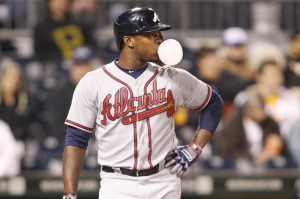
Dustin Salyer contributed to this article.
Everyone take a deep breath.1 Seriously, do it. Good, let’s move on. We are at the midway point of the season and, depending on the placement of your team in the standings, you’re either fully of excitement or apathy about the prospects for rest of the season. Attitude greatly affects what type of fantasy owner you can be. For example, you may be in sixth place and trailing in almost every hitting category, but with a solid pitching staff. For some of you, you may throw in the towel and begin preparing for fantasy football or spend more time with the people you’ve neglected the past two months. If your reaction to the previous sentence is “pish posh,” then you’re my favorite fantasy owner.
I believe there’s always an opportunity for improvement; it’s a matter finding value where others do not. Common phrases that describe this are money ball or market inefficiency; either one works. If a first-place team acquired the best statistics during the first half of the season, that doesn’t preclude your team from having similar statistics during the rest of the season, even if your team is in sixth place. If you play in leagues that allow trades, you have an opportunity to infuse your ball club with talent that can potentially bring you a fantasy championship.
The big questions are who to acquire and who to jettison via trades. That’s how the idea of this series began. Every fantasy owner has different opinions on players because we interpret the data and qualitative analysis differently and have different personal observations. Below are two different opinions, from Matt Commins and Dustin Salyer, on Justin Upton’s viability the rest of the 2013 season. So let’s begin, with Matt leading off.
Matt: In the preseason, I was not as high on Justin Upton as compared to the rest of the fantasy community; I ranked him 23rd overall, which is slightly lower than his ADP in ESPN and NFBC leagues – 16.5 and 18.63 respectively. So, needless to say, I thought he was being over drafted, but I would lying if I saw this coming. There were two major reasons why I was down on him in the preseason. First, he’s never been an elite fantasy player. The best he’s ever finished on ESPNs Player Rater is 17th during the 2011 season. Second, he clearly benefitted playing in the extremely hitter-friendly ballpark in Arizona. Below are his home-road splits for the past three seasons. So, he’s never been an elite fantasy player and was leaving a great home ballpark to a neutral one.
|
|
AB |
HR |
RBI |
SB |
CS |
AVG |
OBP |
SLG |
OPS |
|
Home |
781 |
39 |
131 |
20 |
13 |
.311 |
.392 |
.536 |
.928 |
|
Away |
860 |
26 |
93 |
37 |
12 |
.253 |
.331 |
.408 |
.739 |
In the preseason, a lot was made about how much better the Upton brothers were going to be because they would get to play with each other. I never bought that narrative, because as someone who has two brothers, the last thing I want to do is work with them. Now, I know that sounds bad … it’s just we all have different vocations; one stares at code all day and the other stares into a microscope. Sounds pretty boring right?
I digress.
Since May first, Upton has a slash line of .218/.332/.303 with only three home runs and three stolen bases (in four attempts). In the last 30 days, he is the 78th best outfielder, according to ESPNs Player Rater, putting him behind players such as Zolio Almonte, J.B. Shuck and Clete Thomas. During this time period, he has a .297 BABIP, so he’s not getting unlucky with balls in play. With a “high” ground ball rate of 43.5 percent and “low”2 fly ball rate of 36.6 percent, I see little reason to believe he is going to revert back to the player we saw in the month of April. What’s most troubling is the lack of contact he’s making on pitches in the strike zone. According to FanGraphs, he’s only making contact 74.6 percent of time with balls in the strike zone, compared to a career average of 81.5 percent. If you can acquire Upton on the cheap, Alfonso Soriano for example, then full speed ahead.
Dustin: Matt, I think you have done a nice job putting a few nails into the coffin of Justin Upton. Before we bury his awful 2013 campaign, let’s look a bit further at this, because I feel there’s an enormous buy-low potential here with Justin Upton. Writing players off who have struggled or slumped through a small sample size is not going to win you championships. First off, let’s revisit his ground ball rate and fly ball rate.
|
Season |
GB/FB |
LD% |
GB% |
FB% |
HR/FB |
|
2007 |
0.75 |
16.00% |
36.00% |
48.00% |
4.20% |
|
2008 |
0.89 |
20.90% |
37.20% |
41.90% |
15.30% |
|
2009 |
1.28 |
18.90% |
45.50% |
35.70% |
18.80% |
|
2010 |
1.05 |
19.30% |
41.40% |
39.40% |
12.40% |
|
2011 |
0.82 |
18.20% |
36.90% |
44.80% |
14.80% |
|
2012 |
1.23 |
20.60% |
43.80% |
35.60% |
11.00% |
|
2013 |
1.17 |
18.10% |
44.20% |
37.70% |
20.00% |
|
Total |
1.04 |
19.20% |
41.20% |
39.60% |
14.30% |
This chart is pulled straight off of Fangraphs. As you can see, his 2013 numbers look very similar to his 2009 season, the year he hit 26 home runs. This data, for Justin Upton, does not really show us much of anything. He has shown in the past he can have a higher ground ball rate and still jack home runs. But before I jump and offer something up for Upton, I want to know what has caused this slump and whether he can do something about it.
First thing that comes to mind: Is it possibly injury related? There has not been a peep out of the Braves camp. Also, after a two-month slump, surely he would have hit the DL with a lat-strain or some type of wrist injury. So, for now, let’s rule this out. Matt pointed out the drop in contact, but let’s go further with an article written by the guys at Rotographs. While I don’t want to steal their thunder, they point to Justin Upton not being able to catch up to the fastball properly and the fact he has had mechanical issues like this in the past. A mechanical issue would explain the drop in contact% and is something I guarantee the Braves are working on to correct. If he goes back to pulling the ball and making contact, right there would be reason enough to buy into Justin Upton, and the cheaper he comes, the better.
Moving forward, Justin Upton has the ability and upside to capture some of his glory back this season. The Braves need him to fix his mechanical issues and, if he does, he could be a very nice acquisition for a prospective fantasy owner going for a championship. Going back to the ESPN player-rater Matt linked to above, Upton is 24th on the player rater for the season, right behind Alejandro De Aza. If I owned De Aza and could flip him for Upton, I would do that in a heartbeat. The upside alone would be worth it. Because who do you trust more to stay in that top 25, De Aza or Upton? Turning a player like De Aza into Upton is how you win championships.
1. I’ve been following the 4-7-8 breathing technique from Dr. Andrew Weil for a week now and I love it!
2. Both metrics are considered low because, according to FanGragphs, those are league average peripherals. With an ADP in the middle of the second round, fantasy owners are looking for elite preripherals.


